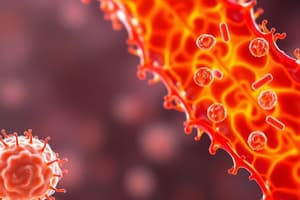Podcast
Questions and Answers
What do somatic cells primarily compose?
What do somatic cells primarily compose?
- The reproductive system
- The nervous system
- Most of the body’s tissues and organs (correct)
- The immune system
Where are somatic cells predominantly found?
Where are somatic cells predominantly found?
- In the endocrine system
- In most of the body’s tissues and organs (correct)
- In the bloodstream
- In the digestive system
What is the main role of somatic cells in the body?
What is the main role of somatic cells in the body?
- Supporting the reproductive system
- Constituting the majority of the body’s tissues and organs (correct)
- Producing hormones for growth
- Regulating the body’s temperature
What is the main difference between germplasm and somatoplasm?
What is the main difference between germplasm and somatoplasm?
What characterizes mortal cells, such as somatic cells?
What characterizes mortal cells, such as somatic cells?
What is the result of the Hayflick limit in mortal cells?
What is the result of the Hayflick limit in mortal cells?
What is the role of immortal cells, such as germ cells?
What is the role of immortal cells, such as germ cells?
What distinguishes protoplasm of the germ cells from protoplasm of the body cells?
What distinguishes protoplasm of the germ cells from protoplasm of the body cells?
Flashcards are hidden until you start studying
Study Notes
Somatic Cells Overview
- Somatic cells primarily compose the body tissues and organs, excluding reproductive cells.
- Predominantly found in all tissues and organs of multicellular organisms, forming structures like skin, muscles, and internal organs.
- Main role is to support the body's structure and functions, including growth, repair, and maintenance of tissues.
Germplasm vs. Somatoplasm
- Germplasm refers to the reproductive cells (sperm and eggs) involved in heredity and reproduction.
- Somatoplasm encompasses all somatic cells, providing the bulk of the individual’s cellular makeup and sustaining bodily functions.
Characteristics of Mortal Cells
- Mortal cells, like somatic cells, have a limited lifespan characterized by a specific number of divisions they can undergo.
- The Hayflick limit results in mortal cells ultimately ceasing to divide after a set number of mitotic divisions, usually around 40-60 for humans.
Role of Immortal Cells
- Immortal cells, such as germ cells, play a critical role in reproduction, maintaining the continuity of genetic information across generations.
Protoplasm Distinctions
- Protoplasm of germ cells is specialized for reproductive function, containing genetic material and structures necessary for fertilization.
- In contrast, protoplasm of body cells is organized for diverse cellular functions, reflecting the specific needs of tissues and organs.
Studying That Suits You
Use AI to generate personalized quizzes and flashcards to suit your learning preferences.




